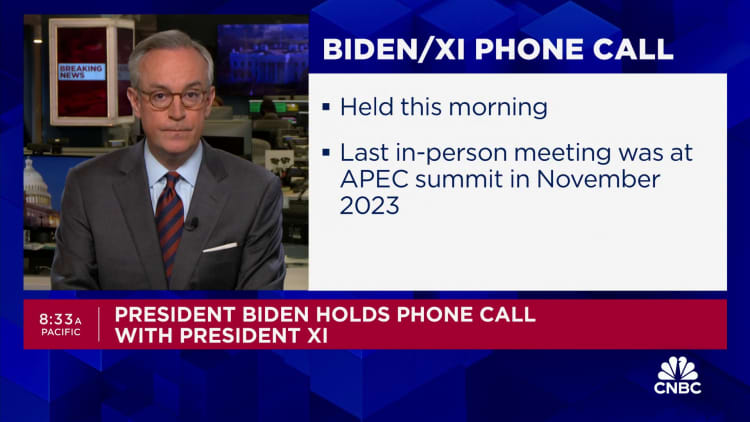

U.S. President Joe Biden spoke by phone with Chinese President Xi Jinping on Tuesday, a call the White House described as a way for the two leaders to “communicate” and responsibly manage tense U.S.-China relations.
“Intense competition requires intense diplomacy to control tensions, clear up misunderstandings and prevent accidental conflict,” a senior administration official told reporters on Monday. “This call is one way to do that.”
In the call with Xi, the first such call since July 2022, Biden raised a series of U.S. concerns, according to a White House transcript of the call.
Specifically, Biden confronted Xi over China’s “unfair trade policies and non-market economic practices,” the White House said. The president also told Xi that he would continue to take “necessary actions” to deny China access to U.S. technology if it poses a national security risk.
For example, Biden launched an investigation in February China smart carOut of concern they could undermine U.S. national security by connecting to U.S. infrastructure and extracting driver data.
In addition to U.S.-China economic relations, the two leaders also discussed Taiwan and tensions over China’s support for Russia’s invasion of Ukraine. Biden also raised the possibility of cybersecurity threats, especially ahead of the U.S. presidential election in November.
“We have been very clear about our concerns about any country interfering in or influencing our elections,” a senior administration official said Monday.
Biden and Xi last met face-to-face in November during a summit in Woodside, California.
There, leaders agreed to resume military exchanges between China and the United States. Biden administration officials said there have been a number of key meetings and conversations among military leadership since then, with more expected later this year.
Biden’s top economic envoy, Treasury Secretary Janet Yellen, is scheduled to depart for China on Wednesday for five days of in-person meetings with her Chinese counterparts in Guangzhou and Beijing. Secretary of State Antony Blinken also plans to visit China later this year.
“There is no question that the U.S.-China economic relationship is stronger now than it was two years ago,” a senior Treasury official said at a news conference previewing Yellen’s trip on Monday. “We know there are deep challenges and divisions in this relationship, and they won’t be resolved overnight.”
Yellen warned in a speech last week that she was concerned about China’s overproduction of clean energy products such as solar panels, electric vehicles and lithium-ion batteries. China is using that surplus to flood global markets and drive down pricing in green industries that are still growing in countries like the United States, she said.
Yellen said this was one of the issues she planned to discuss with her Chinese counterparts during her visit. The Chinese Embassy in Washington later denied that there was overcapacity.
In recent weeks, the U.S. Treasury Department has also highlighted concerns about Beijing’s financial behavior, particularly China’s alleged use of “early-stage” investments in U.S. technology companies as a way to obtain sensitive data.
Such a meeting that Yellen plans to hold is part of the Biden administration’s overall effort to stabilize relations between the superpowers after a yearlong freeze in communications. The collapse began with Trump-era tariffs that sparked a near-trade war and continues after Biden imposed trade restrictions on the United States.
“Looking back at that meeting in November, both President Biden and President Xi agreed that they were going to try to answer the phone more,” the senior administration official said. “Both sides realized that doing so was important to truly governing in a more responsible way. Relationships are very important.”







